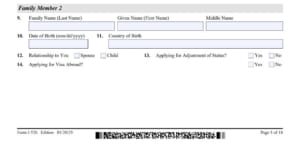Foreign nationals who arrive in the United States as nonimmigrants and then file for adjustment of status may also file for advance parole in conjunction with their Form I-485, Application to Register Permanent Residence or Adjust Status with the United States Citizenship and Immigration Services (“USCIS”).
Advance Parole differs from a Re-Entry Permit because while both use the same form; Form I-131, Application for Travel Documents, Parole Documents, and Arrival/Departure Records, USCIS issues Advance Parole to those seeking to temporarily depart the United States before their lawful permanent residence is approved. A re-entry permit is for those who are already lawful permanent residents and are looking to travel outside the United States for a short period without abandoning their permanent resident status.
An example of a foreign national who would be eligible for Advance Parole is somebody who entered the U.S. on a K-1 fiancé visa. After arriving and marrying their U.S. citizen fiancé within 90 days, the new immigrant spouse should file for adjustment of status. If the new immigrant spouse needs to travel abroad (i.e. visit the foreign national’s family during the adjustment period), Advance Parole would be required in order to return to the United States. Thus, having been approved for Advance Parole would allow for the foreign national to depart and return without abandoning their ongoing adjustment of status application.
Once the adjustment of status has been approved, the new immigrant spouse will have lawful permanent residence and Advance Parole is no longer required to re-enter the United States. The new immigrant spouse would use their Form I-551 “Green Card” as a visa to reenter the United States. If the lawful permanent resident is looking to spend a prolonged period of time outside the U.S., applying for a re-entry permit with USCIS may be necessary.
For more information on advance parole and re-entry permits, contact us at info@enterlinepartners.com.
ENTERLINE & PARTNERS CONSULTING
Ho Chi Minh City, Vietnam Office
146C7 Nguyen Van Huong St, Thao Dien Ward,
District 2, Thu Duc City
Ho Chi Minh City, Vietnam
Tel: +84 933 301 488
Email: info@enterlinepartners.com
Facebook: Enterline & Partners – Dịch vụ Thị thực và Định cư Hoa Kỳ
YouTube: @EnterlineAndPartnersConsulting
Website: http://enterlinepartners.com
Manila, Philippines Office
LKG Tower 37th Floor
6801 Ayala Avenue
Makati City, Philippines 1226
Tel: +63 917 543 7926
Email: info@enterlinepartners.com
Facebook: Enterline and Partners Philippines
Website: https://enterlinepartners.com/language/en/welcome/
Copyright 2025. This article is for information purposes only and does not constitute legal advice. This article may be changed with or without notice. The opinions expressed in this article are those of Enterline & Partners only.




